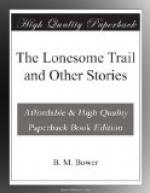Weary protested; he swore; he threatened. He was not in the least like his old, sweet-tempered self. He mourned openly because he had no longer a gun that he might slay and spare not. He insisted that he would take much pleasure in killing them all off—especially Pink. He felt that Pink was the greatest traitor in the lot, and said that it would be a special joy to him to see Pink expire slowly and in great pain. He remarked that they would be sorry, before they were through with him, and repeated, many times, the hint that he never forgot a friend or forgave an enemy—and looked darkly at Pink.
“You’re batty,” Pink told him sorrowfully, the while they led him out through the lane. “We’re the best friends yuh got—only yuh don’t appreciate us.”
Weary glared at him through a tangle of brown hair, and remarked further, in tones that one could hear a mile, upon the subject of Pink’s treachery and the particular kind of death he deserved to die.
Pink shrugged his shoulder and grew sulky; then, old friendship growing strong within him, he sought to soothe him.
But Weary absolutely declined to be soothed. Cal, serene in his fancied favoritism, attempted the impossible, and was greeted with language which no man living had ever before heard from the lips of Weary the sunny. Jack Bates and Happy Jack, profiting by his experience, wisely kept silence.
For this, the homeward ride was not the companionable gallop it usually was. They tried to learn from Weary what he had done with Glory, and whence came the mud-colored cayuse with the dim, blotched brand, that he bestrode. They asked also where were the horses he had been sent to bring.
In return, Weary began viciously to dissect their pedigree and general moral characters.
After that, they gave over trying to question or to reason, and the last two miles they rode in utter silence. Weary, tiring of venom that brought no results, subsided gradually into mutterings, and then into sullen silence, so that, save for his personal appearance, they reached camp quite decorously.
Chip met them at the bed wagon, where they slipped dispiritedly off their horses and began to unsaddle—all save Weary; he stared around him, got cautiously to the ground and walked, with that painfully circumspect stride sometimes affected by the intoxicated, over to the cook-tent.
“Well,” snapped Chip to the others, “For once in his life, Happy was right.”
Weary, still planting his feet primly upon the trampled grass, went smiling up to the stupefied Patsy.
“Lord, how I do love a big, fat, shiny Dutch cook!” he murmured, and flung his long arms around him in a hug that caused Patsy to grunt. “How yuh was, already, Dutchy? Got any pie in this man’s cow-camp?”
Patsy scowled and drew haughtily away from his embrace; there was one thing he would not endure, even from Weary: it was having his nationality too lightly mentioned. To call him Dutchy was a direct insult, and the Happy Family never did it to his face—unless the provocation was very great. To call him Dutchy and in the same breath to ask for pie—that, indeed, went far beyond the limits of decency.




